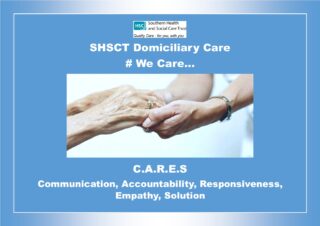Q Exchange
Digital System allowing Communication and Capacity Identification within Domiciliary Care
- Proposal
- 2024

What is the challenge your project is going to address and how does it connect to the theme of 'How can we improve across system boundaries?
Currently the social care service is reliant on manual communication methods and verbal communication via staff’s own phone. Staff are lone workers and provide vital community care by completing 54,000 contacts per week.
Following on from previous Quality improvement projects focusing on communication and involving staff at all levels, further challenges still exist with timely relaying of information. Contributing to these challenges is a lack of communication infrastructure and resource.
Our current manual processes are inefficient, delaying reviews of care for the service users. There is also no transparency of capacity which results in delayed discharges from hospital and limits our ability to accept outstanding packages of care.
Currently there is no assurance that allocated work is completed, leaving both service users and the Trust vulnerable.
Currently difficult to make contact with the staff member who is positioned out on the road, often slowing down the flow of information.
What does your project aim to achieve?
- To implement a new communication system that will be accessible on iPads (45 in total) and Trust computers, improving communication between staff and allow timely and accurate information to be shared.
- It will allow the timely reporting of potential effectiveness triggering a review of a service users package of care.
- This system includes PPI, with service users being able to interact, giving them the assurance that their loved ones are safe and have received their scheduled care.
- It would also allow a real time overview that accurately reflects the capacity within the service, allowing for timely discharge or alternative care arrangements to help improve the service user experience.
- There are digital systems already implemented within other organisations although our intention would be to innovate to further reduce inefficiencies within the administration team allowing for the digital collation of pays and mileage submissions that are currently completed manually, leading to discrepancies.
How will the project be delivered?
- Securing the hardware including iPads and the software, CareLine Live.
- Using existing capacity within the service to develop and deliver a training programme for involved staff.
- To develop Standard Operating Procedures for the functioning of the new system and processes, building on the already agreed DHCNI protocols and business case (that includes the already signed off data protection agreements).
- The creation of Care champions to help drive the quality improvement initiative forward and to help drive buy in from staff.
- Identification of key stakeholders, involving them through staff and service user/NOK steering groups.
- To build on and continue to monitor the base line measures already collected as result of our quality improvement work.
- Develop a robust timeline for implementation using the Model for Improvement (PDSA cycles) to test changes and eventually implement fully across the service.
How is your project going to share learning?
The existing quality improvement project that we continue to build on as part of this application, is being presented at the IHI international Forum on Quality and Safety in Healthcare Europe in London in April 2024. As part of those discussions we will be sharing the plans surrounding our Q Exchange application.
The project will be shared with Q Community through regular updates. We will promote the project through regional and local QI forums including the HSCQI and our Southern Trust QI annual events.
Learning will be shared with NISCC at monthly provider engagement meetings to help facilitate the spread of learning, knowledge and outcomes both locally, regionally and nationally.
We will share through our corporate Communications Team, Domiciliary Care newsletter, team meetings and through service user reviews and memos. This will celebrate the work and individuals involved and encourage input from stakeholders to inform our direction and implementation.
How you can contribute
- If there are any teams familiar with implementing technology enabled care in similar circumstances and/or facilitating communication through a similar system to a staff group that are so used to being isolated in the community. We would be keen to communicate with them to aid in the design of the training, to discuss any challenges to implementation and to suggest further opportunities for making the most out of the system and surrounding processes (what worked well etc.).
- An extensive piece of outreach work with has already been completed to determine the best system and to explore some of the intricacies around implementing it (exploring what is required for data protection sign off etc.). This involved visiting Nurse Plus Hastings in England, liaising with South Eastern Health and Social Care Trust and the Strategic Planning and Performance Group (Northern Ireland). This has resulted in the project being signed off pending resource.
Plan timeline
| 14 Aug 2024 | Ordering of Devices (governance approval already in place) |
|---|---|
| 21 Aug 2024 | Setting up stakeholder engagements |
| 18 Sep 2024 | Training on the devices and CareLine Live system |
| 16 Oct 2024 | Implementation into selected areas |
| 13 Nov 2024 | Run reports and set up communication meetings with MDT |
| 11 Dec 2024 | Review and share learning |
| 22 Jan 2025 | Plan scale and spread to other areas in the Trust |
| 5 Mar 2025 | Phase 2 (scale and spread) commences |
Comments
Jacqueline Morton 1 Mar 2024
When I listen to your video it looks like you have already undertook a staff communication project that this will build on. How will staff be actively involved in the implementation of your project?
Why is this project important to clients and staff?
Comments are now closed for this post.